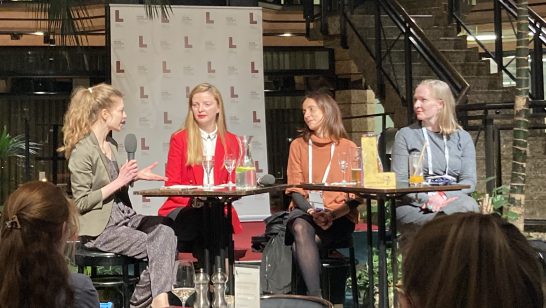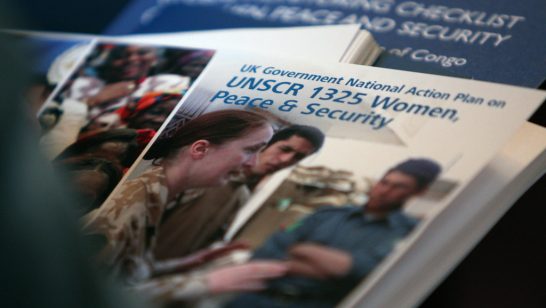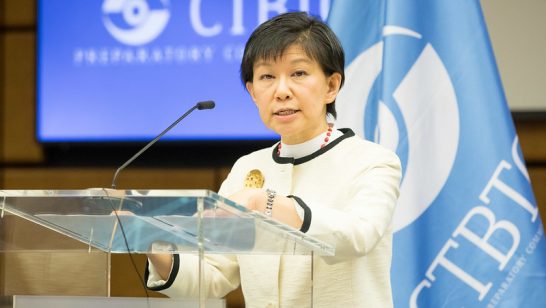In 2018, the European Leadership and its Director, Sir Adam Thomson, joined Gender Champions in Nuclear Policy (GCNP) and signed the panel parity pledge. The GCNP initiative asks participating Directors and Heads of organisations to commit their institutions to implement a minimum of three commitments to improve and address gender imbalance, measured across a 12-month period.
The ELN committed to four, and we continue our work to improve gender representation at all levels and the open publication of our progress (in line with GCNP reporting years).
Commitment 1: Extend the personal panel parity pledge to the whole ELN team to challenge unbalanced panels (as per the terms of the pledge).
- 2020: The team was made aware of the commitment and accepted invitations accordingly. From June 2018-2019, the baseline for ELN-led events was approximately 27% female. From 2019- January 2020, we elevated this to 41%. External tracking metrics were incomplete.
- 2021: This reporting year, staff participated in 44 external events, 86.4% of which were gender-balanced. Of events the ELN organised, all were mixed-gender with no same-gender panels.
- 2022: In 2021-2022, ELN staff participated in 61 public-facing or external events. Of these, 23 were organised by the ELN (none same-gender), three jointly (none same-gender), and 32 externally facilitated (one all-male, and in which the panel parity pledge was raised and alternative voices offered). Overall, our balanced panel success rate is 98.3%, up from 86.4% the previous year. However, we are now measuring this commitment more holistically, and report that only 63.9% of events were considered truly balanced, 3.3% had gendered diversity in their moderation only, and 24.6% were deemed to involve “very few women”.
Commitment 2: Improve gender balance in our commissioning practice with a target of 50:50.
- 2020: We made a concerted effort to target, approach, and support female authors, involving all team members in the commissioning process, requesting suggestions for experts within professional networks to redress our imbalance. Progress was slower than we had hoped, having seen only a 5% lift from June 2019-January 2020 to reach 37% female, 63% male.
- 2021: This reporting year, the ELN delivered 80 authored publications – a mix of commentaries, reports, policy briefs, and podcasts – of these, 41.25% were female, 53.75% male, and 5% of co-authored male and female. In our commentary commissioning, figures were higher, achieving 43% female, 52% male, and 4% mixed. We will continue this effort with a target of gender parity, either co-authored or single-gender, in the coming year.
- 2022: In 2021-2022 the ELN delivered 89 publications, 34.8% of these were authored by women, 46% by men, 15.7% with mixed gender, and 3.3% co-authored by persons of the same gender. When looking at commentary commissioning alone, of 77 articles, 37.6% were authored by women, 7.8% were co-authored/mixed gendered, and 54.6% were by men, a slight decrease on the previous year. An increase in mixed/co-authored publications this year has allowed us to reach near parity, with an aggregate of 51.6% female authorship.
Commitment 3: Improve gender balance in all three of our main networks: Senior Network, Contact Group and the Younger Generation Leaders Network (YGLN).
- 2020: Unfortunately, we did not meet this commitment in the senior network. We identified several candidates for membership and approached them with invitations but were unsuccessful in recruitment. In the Younger Generation Leaders Network, we accepted only women in order to redress its gender imbalance, taking regional distribution and professional expertise into account. The YGLN saw an uplift of 4% from 35%-65% (Female-Male) to 39%-61% this reporting year.
- 2021: The ELN senior network grew by 18 people, 11 of which are women. The composition of our senior network is now 84% male to 16% female – an uplift of 5% from the previous reporting year. There is still work to do. We recruited additional members to the Contact Group on Russia-West relations, surpassing our objective to reach gender parity, resulting in a 55% female composition. We grew our Younger Generation Leaders Network to 108, reaching a near parity at 49% female to 51% male (53:55).
- 2022: In this reporting year, we recruited only four new members to the Senior Network (-77% compared to the previous year) – of these, 75% (3:4) were women. We sadly lost two existing members, and growth is slow at a single percentage point. Progress in diversifying this network has been more challenging than anticipated. Nonetheless, since joining the GCNP, we have increased the number of women in this network by 127%. Our Younger Generation Leaders Network has remained static from the last reporting year at 49%-51% gender balance, whereas the Contact Group on Russia-West relations grew to a 56%-44% composition, weighted toward women.
Commitment 4: Improve gender balance on our Executive Board (allowing for the timing of AGMs).
- 2020: This is an ongoing commitment. Upon joining GCNP, the Executive Board was 89% male – 11% female (8:1). This year, we secured two additional women to sit on the Board, improving to 67% male – 33% female (6:3).
- 2021: We hope to attain and solidify this commitment in the next reporting year. In recruiting another member, the composition of our Executive Board is now 60% male – 40% female (6:4), a marked improvement from 2019.
- 2022: Unfortunately, with the withdrawal of a member from the Executive Board, we returned to our 2020 composition of three women to six men, or 33.3%. We hope to improve these statistics in 2022-23, allowing for annual meetings and due processes.




